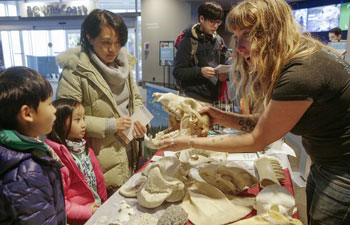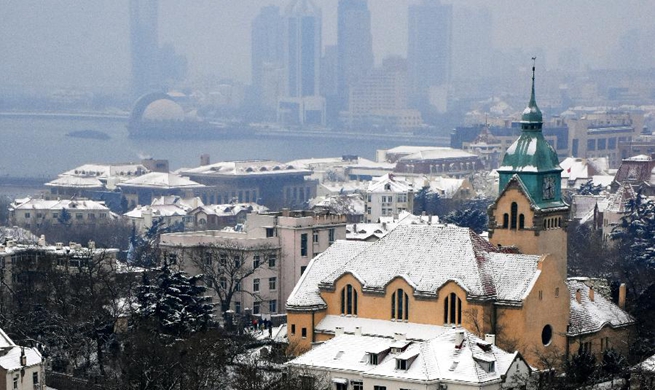By Gao Lu, Huang Chao, Xia Lin
NEW YORK, Jan. 28 (Xinhua) -- Charting through her sophomore year at the University of Texas (UT) at Austin, Fan Yilan from China is well aware of the ebb-off occurring to the group she is a member of.
Told that the number of new international students - those enrolled at a U.S. institutions for the first time in fall 2016 - declined by nearly 10,000 students to about 291,000, a 3 percent decrease from the previous year, she shrugged, saying that "America is not the only option anymore. Plus, it's more expensive compared to other countries."
INVEST MORE, GET LESS
This is the first time that these numbers have declined in the 12 years since the Institute of International Education of the United States (IIE) released its annual Open Doors Data to report new enrollments.
Further flattening is expected for 2017/18 academic year, it added.
"We have more options right now. We can go to Australia, Canada and England," Fan explained it to Xinhua, echoing the conclusion in the IIE report which listed other destinations, rising tuition, campus insecurity and application complexity as factors leading to the contraction.
Joyce Wang, a Chinese student at the University of Southern California (USC), complained that each year she had to pay more to stay on campus.
"I attended USC in 2014. The tuition fee keeps increasing ever since. I think that's one of the reasons that less international students come here," she told Xinhua.
Meanwhile, Fan said that U.S. universities and colleges have increased their standards, making it harder for foreign applicants to get admitted, even though they have the same experiences and TOFEL or SAT scores as U.S. students.
"So in general, if you invest more, you are getting less," added Fan from Beijing, who currently double majors in accounting and economy.
WORRIES OVER IMMIGRATION POLICY
Admission officials and students at USC gave sharper insights behind the decline, for it is the U.S. higher education organization most centrated and diversified in international students.
Recently experiencing a 5 percent flattening in enrollment of foreign students for his project, Ben Lee, Associate Director of Master of Communication Management Program, attributed the shrinking to the immigration policy initiated by the administration of Donald Trump.
"The new administration is changing the immigration policy, especially those governing H1-B sponsorship. That's certainly a concern. But no doubt the uncertainty is not going to help and not going to encourage applications," Ben told Xinhua.
Roberto Romero from Bolivia echoed the view that international admission was jolted, as the H1-B sponsorship became more restrictive.
"I've been reading a lot of articles on fewer people coming to the United States for study. I think that makes sense to me based on the past election and the hostile environment right now for immigrants. So I think you see these repercussion on other countries as well," he said.
The H1-B visa program for international students has been revised under the Trump administration. Their admission is now more influenced by political rather than education considerations. The restriction delivers heavily, because many people come to the United States not only for study, but work full time after graduation.
"It will be harder to get the visa," sighs Roberto, who now pursues a postgraduate degree at Ben's program, after bachelor's experience in Germany and Japan.
MORE COLLEGES AFFECTED
According to campus statistics, more universities and colleges in the United States have witnessed the decline of international admission.
The Wright State University in Ohio has seen a notable drop in international enrollment of nearly 800 students in the past two years; the University of Central Missouri enrolled 944 international students in the fall, a decrease of more than 1,500 from the previous year.
"Growing uncertainty for international student enrollment stems from immigration policies that are in flux," the New York Times recently quoted Moody' s Investors Service as saying.
Trump's "rhetoric and more restrictive views on immigration have made the United States even less attractive to international students," the paper said, adding that "the downturn follows a decade of explosive growth in foreign student enrollment" by U.S. universities and colleges.
DILUTION OF INTEREST
Joyce Wang thought that the decrease of international students is also a reflection of the diluted interest in U.S. education.
"For some developed countries such as Japan, their people are satisfied with their current life. They might not want to go outside to explore more," she said.
In addition, IIE said in its report released in November that "the scaling back of large Saudi and Brazil government scholarship programs were a significant factor, as the number of students from those two countries showed the biggest decreases, particularly in non-degree study."

















